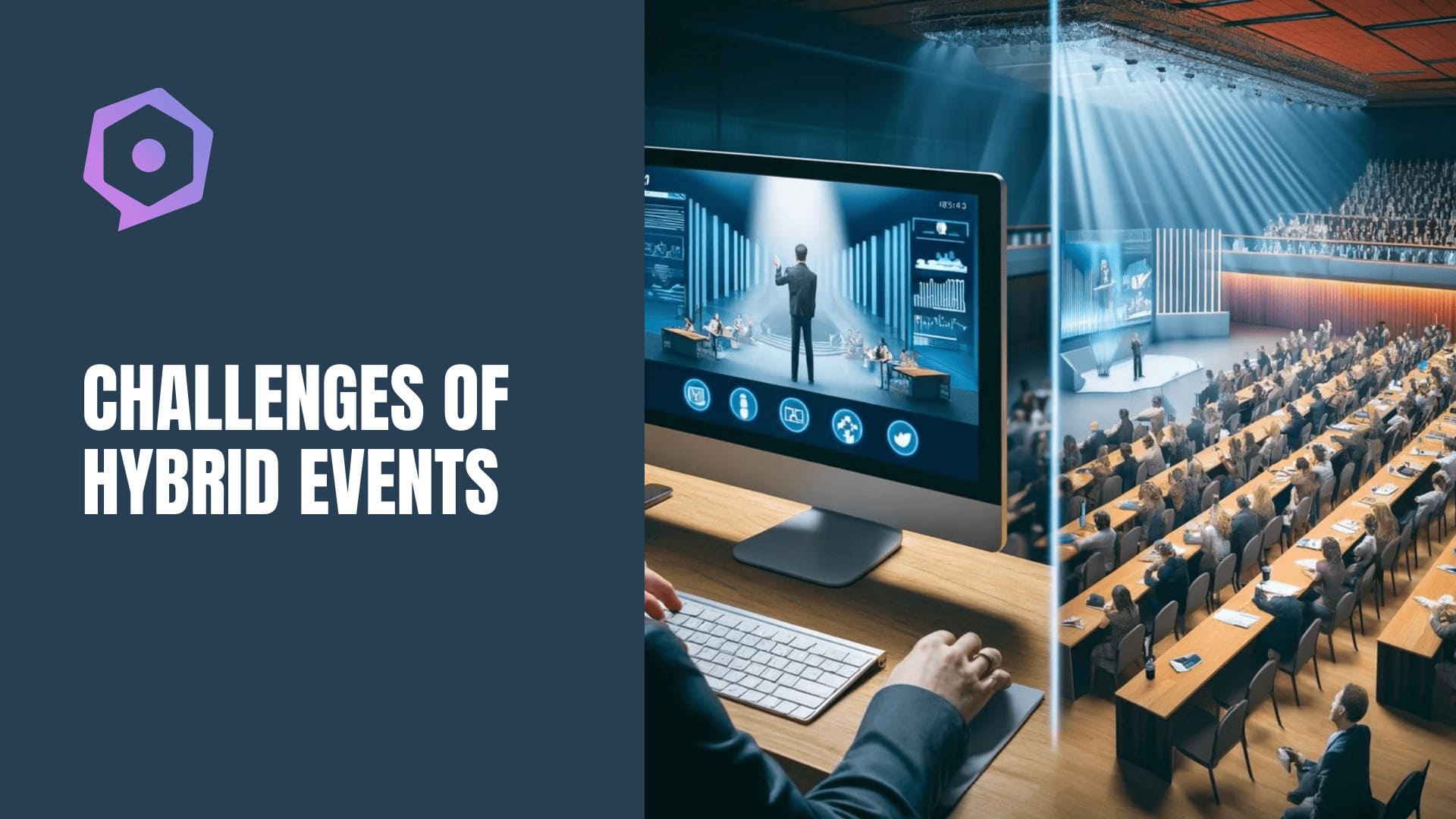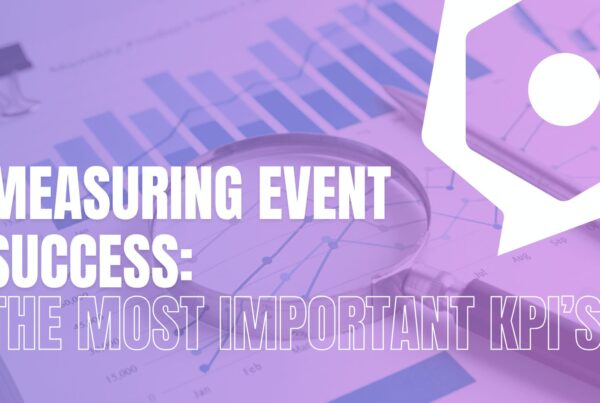Inhalt
- 1 What is a hybrid event?
- 2 What types of events can you host in a hybrid format?
- 3 Examples of hybrid events:
- 4 When should you host a hybrid event?
- 5 Advantages of hybrid events
- 5.1 Greater reach and higher attendance
- 5.2 Lower event costs
- 5.3 Engaging events and increased interaction
- 5.4 Recordings you can reuse
- 5.5 Additional data for marketing
- 5.6 Sustainability
- 5.7 More international speakers
- 5.8 Better sponsorship opportunities
- 5.9 More revenue with higher ticket prices on-site
- 5.10 Fewer restrictions and better planning security
- 6 Disadvantages of hybrid events
- 7 Additional challenges of hybrid events
- 8 How to make a hybrid event a success
- 9 Conclusion
An ever-increasing number of events are being hosted in a hybrid format. Are hybrid events the new normal? After all, these events can reach a wide, international audience and in-person participants. So what is behind the hybrid event format? And how do you successfully implement this event type? This article will define hybrid events, evaluate various formats, and explore examples of successful hybrid events.
Additionally, we’ll closely examine the pros and cons of this event format and discuss how you can host a stellar hybrid event.
What is a hybrid event?
In the event industry, hybrid events are those that take place simultaneously in-person and online. They are a mix of on-site and virtual events. While the number of tickets is limited for in-person events, participants can also decide to purchase online tickers, and watch the event via livestream. All you need is a stable internet connection. This allows people from around the world to attend, regardless of where they are physically located. Online attendees are not simply observers, contrary to most digital events. Instead, they are an integral part of the in-person event. With the help of live chats, Q&A rounds, games, and virtual meeting rooms, online participants are actively involved in the event in real time. All attendees can receive the same content and have the same opportunities for participation. Additionally, presentations and other content are often posted online for a set amount of time. This seamless connection between online and offline components offers flexibility and significantly expands the reach of events.

What types of events can you host in a hybrid format?
arious events can be hosted in a hybrid format. Since many organizations recognize the added value of hybrid formats, we will see more creative concepts for these events. Here are several examples of possible hybrid event types:
- Congresses, Conferences und Tagungen
- Meetings and Workshops
- Cultural Events
- Trade Fairs and Exhibitions
- Works Council and Supervisory Board meetings
- Shareholders’ Meeting
- Press Conferences
- Product Presentations and Sales Kick-Offs
- Concerts and Festivals
- Sport events
- Panel discussions
These formats are ideal event types that can offer all attendees, both in-person and online a seamless experience.

Examples of hybrid events:
There are numerous examples of successful hybrid events. We have compiled three examples from different branches below:
Assistants’ World 2022 Conference & Expo
The conference, which has been hosted annually since 2002, was held as a hybrid event for the first time in 2022 with talque’s help. As Germany’s only trade fair and congress for assistants, the event has long since established itself as a must-attend event that no office professional in the industry can afford to miss. 250 people attended on site and 200 people participated via digital stream. Creative formats such as the “Running Reporter” brought online and offline visitors together, while online and offline meeting functions and interactive social boards encouraged attendees to sharing of images, videos, and comments.
Hinterland of Things Conference 2022
Hinterland of Things is a prestigious technology conference in Germany dedicated to driving technological development and innovation in the German SME sector. Every year, over 1300 participants come to Bielefeld to network, share knowledge and promote innovation. In 2022, digital tools were introduced to help participants navigate the conference, make contacts, and support on-site engagement. Fostering meaningful connections between attendees, sponsors, and exhibitors is a priority for the event.
Swiss Conference on Data Science
The SDS conference emphasizes innovation in the field of data science, prioritizing research and knowledge exchange. Since quality is the highest priority for the SDS conference. We’ve developed an online voting system, with which the attendees can rate the Speakers and Presentations, sharing their direct feedback. Additionally, the Presentations were streamed over the talque platform and later made available on demand. Additionally, the customizable agenda, chat function, and “Best Matches” page which facilitated networking, were among the most important functions of the platform.

When should you host a hybrid event?
Hosting a hybrid event can be helpful in various situations, depending on the goals and needs of your attendees. While in virtual events are often sufficient, face-to-face meetings are also incredibly valuable experiencess. Here are some cases in which hybrid events can be beneficial:
- Limited Budget: Hosting a hybrid event can lower the costs of hosting an event, since it requires fewer financial resources to organize the event. As a rule, face-to-face events have significantly higher costs. At the same time, however, the advantages of personal interaction can still be secured.
- Mix of in-person and virtual components: For an event centered around attendee interaction, the combination of live and virtual elements can offer a multi-faceted experience. For example, networking opportunities discussions, and workshops can be offered in-person and online.
- Flexibility for Attendees: Hybrid events offer a greater degree of flexibility since attendees have the choice of attending in-person or virtually. This can be especially advantageous for people who can’t travel due to health or safety concerns, those who have a smaller travel budget, or people who simply want to attend from the comfort of their own homes. This also applies to venues that only have space for a limited number of attendees.

Advantages of hybrid events
Overall, hybrid events offer the best of both worlds. This flexibility has a variety of advantages. For example, advantages include the potential for a larger audience, lower costs, and greater sustainability. Below we have compiled a list of the key benefits of hybrid events:
Greater reach and higher attendance
Not everyone has the time or financial means to cover the travel costs and ticket fees for an in-person event. Events often have strict participant limits, meaning that not everyone can attend. However, thanks to laptops, tablets and smartphones, participants can attend virtually from anywhere and choose the lectures or content of the live events that are most interesting to them. This removes the hurdles, allowing more people to take part in the event. So, a hybrid event can achieve a greater reach and appeal to significantly more participants.
Lower event costs
When companies opt for hybrid events instead of only on-site events, they often have lower costs. After all, fewer participants will be on-site, which means that organizers can book smaller rooms and also reduce their catering needs. Although additional costs for the virtual components must be factored in, the overall costs are generally lower in a hybrid format compared to purely in-person.
Engaging events and increased interaction
The mix of online and offline events can make the event livelier for everyone involved, increasing attendee engagement. For purely digital events, attendees can only watch speakers and moderators via livestream, while this is possible in person and online for hybrid events. Additionally, there are numerous opportunities for interaction between online and offline audiences, facilitating active involvement and engaging discussions.
Recordings you can reuse
The online recordings are generally saved for hybrid events. This allows all attendees to rewatch sessions they attended or ones they missed days and weeks after the event. For the event organizers, these recordings have an additional advantage: They can use the recordings to advertise future events and reach a wider audience.
Additional data for marketing
An additional advantage of hybrid events is that the digital component allows for greater data collection, that can be analyzed and repurposed for marketing. The data collection process can be more difficult for purely physical events. Depending on the event platform and tools implemented, organizers can analyze their ideal target audience, which topics were especially interesting, where there was the most interaction, and what attendees would like to see more of at the next event. All of these topics can help organizers optimize and advertise their next event more effectively.
Sustainability
For environmental and sustainability purposes, hybrid events are an excellent alternative to purely physical events. Since significantly fewer people will be traveling for the event, you will reduce consumption of fuel, CO₂, and other resources. With a reduced carbon footprint, the whole event will be more eco-friendly and reflect positively on the organizers. Though the energy required to power technology such as streaming equipment must be factored in, the hybrid format more than compensates for these energy expenditures.
More international speakers
Compared with analog events, it’s easier to secure appearances from international experts and speakers from around the world for hybrid events. These speakers have gotten used to virtual appearances and appreciate the reduced travel requirements of virtual speaking engagements. It’s easier to fill your speaker slots since speakers are not required to make travel arrangements and plan their journeys to the event site. Additionally, those who are attending virtually will be accustomed to video appearances.
Better sponsorship opportunities
Your sponsors also benefit from hybrid event formats. They now have the option of gaining visibility in both groups. Additionally, sponsors have more marketing opportunities and reach which increases the promotional value and the attractiveness for sponsors. Particularly in the digital space and content is significantly more accessible, which increases the event’s marketing potential. At the same time, sponsors can decide between a digital or in-person presence, which speaks to different budgets. This allows organizers to secure more sponsorships and cover the costs of parts or all of the virtual event.
More revenue with higher ticket prices on-site
Since hybrid events have a limited number of available tickets, they can be sold at a higher price. Since the demand for on-site tickets is generally larger than the supply, attendees who highly value the in-person experience are willing to spend more on tickets. Online tickets can be sold at the regular price.
Fewer restrictions and better planning security
Physical events are limited by the number of attendees and the venue. At the same time, there can be instances in which events cannot be hosted in person. With hybrid events, you’re on the safe side. Organizers can select their preferred location, offer the appropriate number of in-person tickets, and reach an even larger audience via streaming. If the in-person event is spontaneously canceled, hosting the event entirely online can be a failsafe backup plan.

Disadvantages of hybrid events
Even though there are numerous advantages of hybrid events, it is critical to consider the potential downsides of hybrid events. To ensure event success, it’s important to develop appropriate solutions to any challenges that arise. These are the disadvantages of hybrid events:
Higher Investment Costs
Some expenses can be spared through hybrid events. On the other hand, hybrid events do require investment in technical infrastructure and equipment, to ensure high video and audio quality during livestreams. Additional costs include digital event platforms, which promote increased interaction. Quality is key because technical difficulties can raise bounce rates among virtual attendees.
Additional Personnel
Another potential downside is that more staff may be required for hybrid events. The quality of service should be high for both in-person attendees and those behind their screens. Your staff should be well prepared to address any live communication and technical concerns so that online attendees can quickly resolve any technical issues that may arise.
Increased Networking Complexity
At physical events, networking takes place entirely in person, yet hybrid events must include attendees behind their screens. To ensure a lively exchange, you need to implement creative networking concepts, especially if the digital viewers are present with a time delay or can only communicate with each other via chat.
Finding the right event location
Selecting your event location and venue that satisfies all of your requirements can be a challenging task. This can be difficult even when you have greater options as a result of hosting hybrid formats allowing fewer people to attend in person. A key point is the available bandwidth, to allow for high broadcast quality and strong connection for video calls. Not all locations can satisfy these demands. Additionally, there is always the risk the venue you select is too large if more attendees than anticipated opt for the online option.
Experiences and Emotions
As an event organizer, you need to transport the experiences and emotions, of the live experience into a compelling online format. This is not an easy tasks, it’s difficult to replicate experiences such as spontaneous conversations at the buffet in a virtual format. These live experiences are difficult to translate into an online format. The concept must be compatible with a virtual format and give enough space for networking, experience, and interaction. With these considerations in mind, you can ensure that everyone feels involved in the event.

Additional challenges of hybrid events
When implementing hybrid events, organizers generally face two major challenges: planning two events in one and providing the right content. On the one hand, it requires a balancing act between offline and online events to ensure that the event does not feel like two separate events. While entirely in-person and online events focus on a single event, hybrid events require meaningful overlaps and interaction between in-person and online participants. This increases the level of planning difficulty. From registration and the integration of sponsors to content and gamification, all aspects of the event must also be accessible both on site and virtually so as not to exclude either group. Otherwise, you risk not offering a consistent event experience and disappointing one of the groups. On the other hand, the content and concepts must be interesting enough to appeal to digital participants as well as on-site participants. It is important to note that way the content is communicated should be different for both groups. Therefore, moderators and speakers should make sure that their content reaches both groups. If they don’t, virtual viewers could lose interest and log off . Live chats, polls or Q&A sessions can help keep everyone engaged.

How to make a hybrid event a success
A successful hybrid event offers added value to both online and in-person audiences and appeals to the needs of both groups. A crucial step is creating customized content that is relevant for both the on-site participants and the online audience. This may mean optimizing certain presentations or content specifically for the online audience to maximize their interaction and engagement, and not requiring them to participate in program items designed only for in-person attendees. At the same time, organizers need to focus on creating an experience that excites, inspires and keeps participants away from other distractions. This also includes building a strong sense of belonging that connects all participants. Moderation in plays an especially significant role in actively and regularly involving the online audience in the event. Be sure to create a varied program and ensure that presentations are concise. Small workshop rooms and breakout sessions can also help to ensure that all guests are actively involved. In addition, all content should be offered on demand. This allows virtual participants to participate in the event when it is a convenient time and catch up on missed lectures or sessions. On demand access not only creates more flexible participation, but also increases the overall reach and value of the event. The support and involvement of sponsors is another key aspect to the success of a hybrid event. Sponsors can not only provide financial support, but can also be integrated into the event in an entertaining way and given a stage to present themselves to a wide audience. This can be done through targeted advertising campaigns during the event or by integrating sponsor content into the program. Another important aspect is mastering data analysis. By collecting and evaluating data, companies can gain valuable insights to continuously optimize the event and respond to the needs of participants. This also includes adapting the virtual platform to the event cycle to ensure seamless integration and a smooth experience for attendees.

Checklist and tips for organizing a hybrid event:
- Define the goal of the event and corresponding KPIs
- Define the event framework and choose a suitable venue
- Plan content and tailor the program to the attention spans and time zones of the virtual participants
- Plan the entire event setup and organize suitable technology for the event
- Ensure a fast internet connection
- Set up the digital event portal
- Observe data protection regulations (consult data protection experts if necessary)
- Advertise the event via analog and digital channels
- Install the technology correctly (stage lighting, background noise, etc.) and put it through its paces
- Send the agenda to employees, speakers, presenters and sponsors
- Introduce staff and all participants to the event platform
- Have speakers and presenters rehearse with the technology in advance
- Carry out the event
- Make content available in the long term
- Obtain feedback and evaluate results

Conclusion
Hybrid events offer companies the unique opportunity to address both local and international participants and create a seamless experience. The hybrid format allows you to host events even with a small venue or a limited budget. Despite some challenges such as increased investment costs and the complexity of networking, hybrid events offer numerous advantages such as greater reach, lower event costs and extensive data for marketing. By integrating online and offline elements, companies can reach a wider audience and make their events more sustainable while maintaining a lively event experience. With careful planning, a creative concept and the right content, hybrid events can be a success for everyone involved. In the future, more and more companies will certainly recognize the opportunities offered by a combination of virtual and live events and implement their event in a hybrid format. At the same time, the boundaries will become increasingly blurred and unique experiences will be possible.



